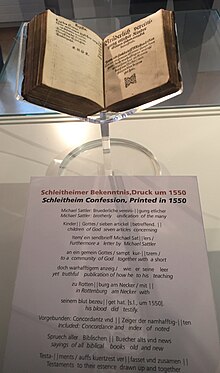| Part of a series on |
| Anabaptism |
|---|
 |
|
|

Anabaptist theology, also known as Anabaptist doctrine, is a theological tradition reflecting the doctrine of the Anabaptist Churches. The major branches of Anabaptist Christianity (inclusive of Mennonites, Amish, Hutterites, Bruderhof, Schwarzenau Brethren, River Brethren and Apostolic Christians) agree on core doctrines but have nuances in practice. While the adherence to doctrine is important in Anabaptist Christianity, living righteously is stressed to a greater degree.
Important sources for Anabaptist doctrine are the Schleitheim Confession and the Dordrecht Confession of Faith, both of which have been held by many Anabaptist Churches throughout history.[1][2]
Daniel Kauffman, a bishop of the Mennonite Church, codified Anabaptist beliefs in the influential text Doctrines of the Bible, which continues to be widely used in catechesis.[2]
John S. Oyer states that the Old Order Amish have an implicit theology that can be found in their biblical hermeneutics, but take little interest in explicit, formal, and systematic theology. It is easier to find out about their implicit theology in talking with them than reading written documents.[3] According to Oyer, their implicit theology is practical, not theoretical.[4] The most important written source of Amish theology, according to Oyer, is "1001 Questions and Answers on the Christian Life".[5][6]
The Hutterites possess an account of their belief written by Peter Riedemann (Rechenschafft unserer Religion, Leer und Glaubens) and theological tracts and letters by Hans Schlaffer, Leonhard Schiemer and Ambrosius Spittelmaier are extant.[7]
- ^ Hershberger, Guy F. (March 6, 2001). The Recovery of the Anabaptist Vision. Wipf & Stock Publishers. p. 65. ISBN 9781579106003.
The Schleitheim articles are Anabaptism's oldest confessional document.
- ^ a b Hartzler, Rachel Nafziger (30 April 2013). No Strings Attached: Boundary Lines in Pleasant Places: A History of Warren Street / Pleasant Oaks Mennonite Church. Wipf and Stock Publishers. ISBN 978-1-62189-635-7.
- ^ John S. Oyer: Is there an Amish Theology in Lydie Hege et Christoph Wiebe: Les Amish : origine et particularismes 1693-1993, The Amish : origin and characteristics 1693-1993, Ingersheim, 1996, pages 278-302.
- ^ John S. Oyer: Is there an Amish Theology in Lydie Hege et Christoph Wiebe: Les Amish : origine et particularismes 1693-1993, The Amish : origin and characteristics 1693-1993, Ingersheim, 1996, page 300.
- ^ 1001 Questions and Answers on the Christian Life, written by 20 members of the Amish ministry and lay people in various communities, published by Pathway Publishers, Aylmer, Ontario and Lagrange, Indiana, 1992.
- ^ 1001 Questions & Answers On The Christian Life at amishamerica.com.
- ^ Ambrosius Spittelmaier at deutsche-biographie.de
© MMXXIII Rich X Search. We shall prevail. All rights reserved. Rich X Search
